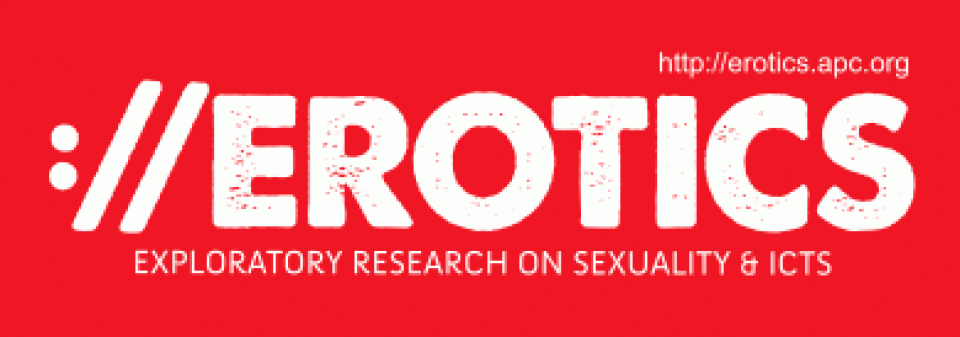
What is the value of the internet in the exercise of sexual rights? From 2008 to 2010, the EROTICS research sought to answer this question, aiming to bridge the gap between policy and legislative measures that regulate content and practice on the internet, and the actual lived practices, experiences and concerns of internet users in the exercise of their sexual rights. The summary report provides an overview of the research, and surfaces the key areas of concern, interest and findings of five national studies. They give a compelling glimpse into the richness of the research universe, and the complexity of the subject.
The project is by the Association for Progressive Communications and was was conducted in five countries - Brazil, India, Lebanon, South Africa and the United States - to answer the question:
How may emerging debates and the growing practice of regulation of online content either impede or facilitate different ways women use the internet and the impact on their sexual expression, sexualities and sexual health practices, and assertion of their sexual rights?
Or expressed differently:
How does the internet facilitate the exercise of sexual rights and the expression of sexualities, particularly of women living in different socio-political, economic and cultural contexts?
How does emerging regulation online affect this ability?
Some of the highlights that have emerged from the research include:
The unexpected and deeply engaged ways that young women in Mumbai negotiate risks online as they strategically use the medium to explore, define and challenge boundaries of gender and sexual norms.
The contradiction between constitutional protections and legislative measures that have the impact of censorship, and how this can constrain the internet's democratising and empowering potential for lesbians and transgender people in South Africa who use it to construct and perform their identities.
The parallel development of the internet and the queer movement in Lebanon, how this has supported the critically valued self-representation of its politics and identity, and how the openness of the internet is currently under threat with the introduction of new punitive legislation.
The arbitrary and unaccountable nature of mandated internet filtering in publicly-funded libraries in the United States, and how this may not only fail to meet its intended objective of protecting young people from potentially harmful content, but may place them under further risk by denying them access to critical information.
The disjunct between the centrality of sexuality in the dynamic and complex policy shifts on internet regulation in Brazil, and the relatively muted awareness and participation by women's rights, feminists and sexual rights movements in the debate offline, in contrast to the vibrant activism, investment and engagement in the topic demonstrated by a diverse range of individual users online.
The project is by the Association for Progressive Communications and was was conducted in five countries - Brazil, India, Lebanon, South Africa and the United States - to answer the question:
How may emerging debates and the growing practice of regulation of online content either impede or facilitate different ways women use the internet and the impact on their sexual expression, sexualities and sexual health practices, and assertion of their sexual rights?
Or expressed differently:
How does the internet facilitate the exercise of sexual rights and the expression of sexualities, particularly of women living in different socio-political, economic and cultural contexts?
How does emerging regulation online affect this ability?
Some of the highlights that have emerged from the research include:
The unexpected and deeply engaged ways that young women in Mumbai negotiate risks online as they strategically use the medium to explore, define and challenge boundaries of gender and sexual norms.
The contradiction between constitutional protections and legislative measures that have the impact of censorship, and how this can constrain the internet's democratising and empowering potential for lesbians and transgender people in South Africa who use it to construct and perform their identities.
The parallel development of the internet and the queer movement in Lebanon, how this has supported the critically valued self-representation of its politics and identity, and how the openness of the internet is currently under threat with the introduction of new punitive legislation.
The arbitrary and unaccountable nature of mandated internet filtering in publicly-funded libraries in the United States, and how this may not only fail to meet its intended objective of protecting young people from potentially harmful content, but may place them under further risk by denying them access to critical information.
The disjunct between the centrality of sexuality in the dynamic and complex policy shifts on internet regulation in Brazil, and the relatively muted awareness and participation by women's rights, feminists and sexual rights movements in the debate offline, in contrast to the vibrant activism, investment and engagement in the topic demonstrated by a diverse range of individual users online.
Year of publication
2011
- 14952 views





Add new comment